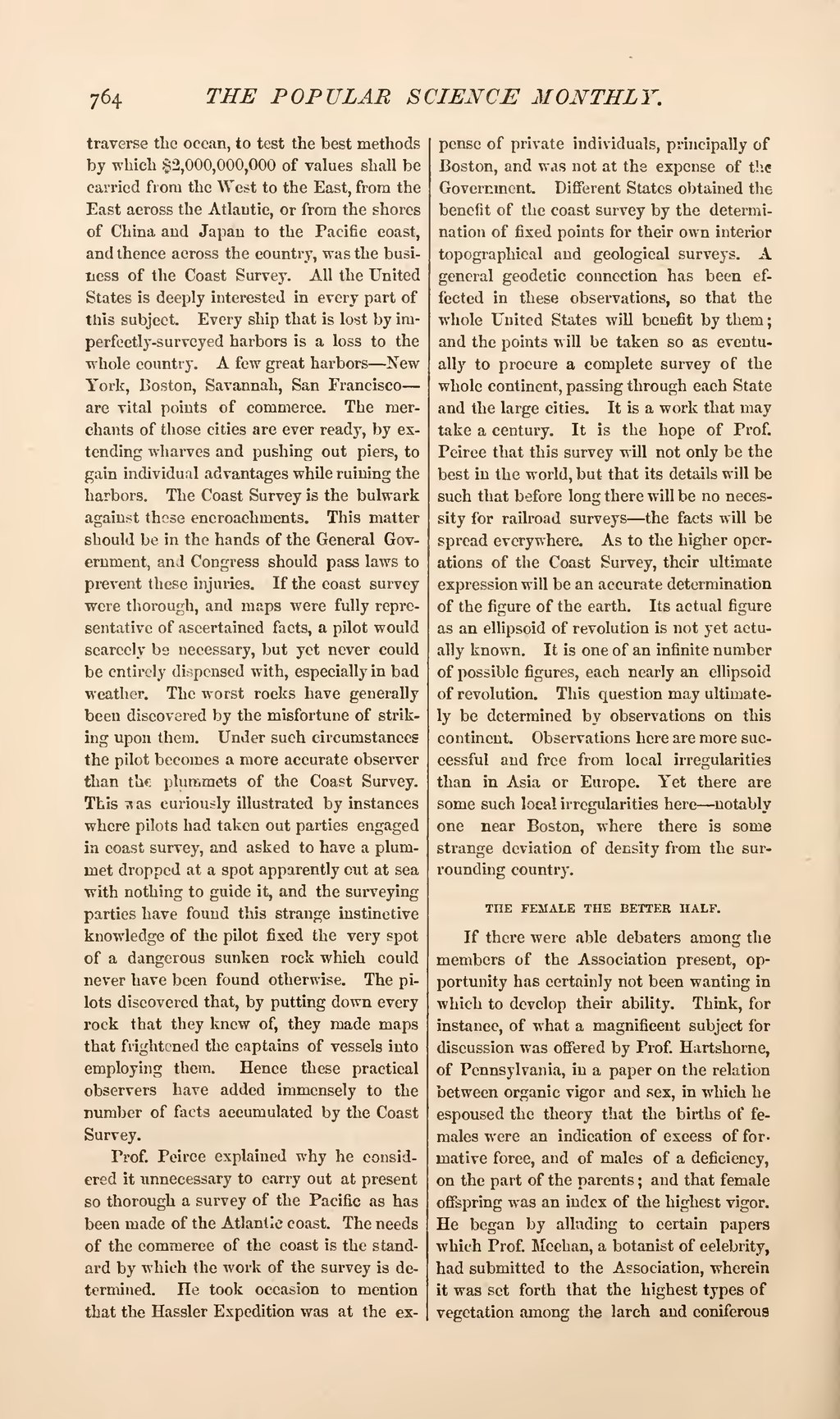traverse the ocean, to test the best methods by which $2,000,000,000 of values shall be carried from the West to the East, from the East across the Atlantic, or from the shores of China and Japan to the Pacific coast, and thence across the country, was the business of the Coast Survey. All the United States is deeply interested in every part of this subject. Every ship that is lost by imperfectly-surveyed harbors is a loss to the whole country. A few great harbors—New York, Boston, Savannah, San Francisco—are vital points of commerce. The merchants of those cities are ever ready, by extending wharves and pushing out piers, to gain individual advantages while ruining the harbors. The Coast Survey is the bulwark against these encroachments. This matter should be in the hands of the General Government, and Congress should pass laws to prevent these injuries. If the coast survey were thorough, and maps were fully representative of ascertained facts, a pilot would scarcely be necessary, but yet never could be entirely dispensed with, especially in bad weather. The worst rocks have generally been discovered by the misfortune of striking upon them. Under such circumstances the pilot becomes a more accurate observer than the plummets of the Coast Survey. This was curiously illustrated by instances where pilots had taken out parties engaged in coast survey, and asked to have a plummet dropped at a spot apparently out at sea with nothing to guide it, and the surveying parties have found this strange instinctive knowledge of the pilot fixed the very spot of a dangerous sunken rock which could never have been found otherwise. The pilots discovered that, by putting down every rock that they knew of, they made maps that frightened the captains of vessels into employing them. Hence these practical observers have added immensely to the number of facts accumulated by the Coast Survey.
Prof. Pierce explained why he considered it unnecessary to carry out at present so thorough a survey of the Pacific as has been made of the Atlantic coast. The needs of the commerce of the coast is the standard by which the work of the survey is determined. He took occasion to mention that the Hassler Expedition was at the expense of private individuals, principally of Boston, and was not at the expense of the Government. Different States obtained the benefit of the coast survey by the determination of fixed points for their own interior topographical and geological surveys. A general geodetic connection has been effected in these observations, so that the whole United States will benefit by them; and the points will be taken so as eventually to procure a complete survey of the whole continent, passing through each State and the large cities. It is a work that may take a century. It is the hope of Prof. Pierce that this survey will not only be the best in the world, but that its details will be such that before long there will be no necessity for railroad surveys—the facts will be spread everywhere. As to the higher operations of the Coast Survey, their ultimate expression will be an accurate determination of the figure of the earth. Its actual figure as an ellipsoid of revolution is not yet actually known. It is one of an infinite number of possible figures, each nearly an ellipsoid of revolution. This question may ultimately be determined by observations on this continent. Observations here are more successful and free from local irregularities than in Asia or Europe. Yet there are some such local irregularities here—notably one near Boston, where there is some strange deviation of density from the surrounding country.
THE FEMALE THE BETTER HALF.
If there were able debaters among the members of the Association present, opportunity has certainly not been wanting in which to develop their ability. Think, for instance, of what a magnificent subject for discussion was offered by Prof. Hartshorne, of Pennsylvania, in a paper on the relation between organic vigor and sex, in which he espoused the theory that the births of females were an indication of excess of formative force, and of males of a deficiency, on the part of the parents; and that female offspring was an index of the highest vigor. He began by alluding to certain papers which Prof. Meehan, a botanist of celebrity, had submitted to the Association, wherein it was set forth that the highest types of vegetation among the larch and coniferous

